Polish pleśniak cake consists of layers of shortcrust pastry, a tangy fruit mixture and soft meringue. Delicious and perfect for any occasion! The post incudes easy to follow, detailed step-by-step instructions.
You might also like traditional Polish apple cake (szarlotka).
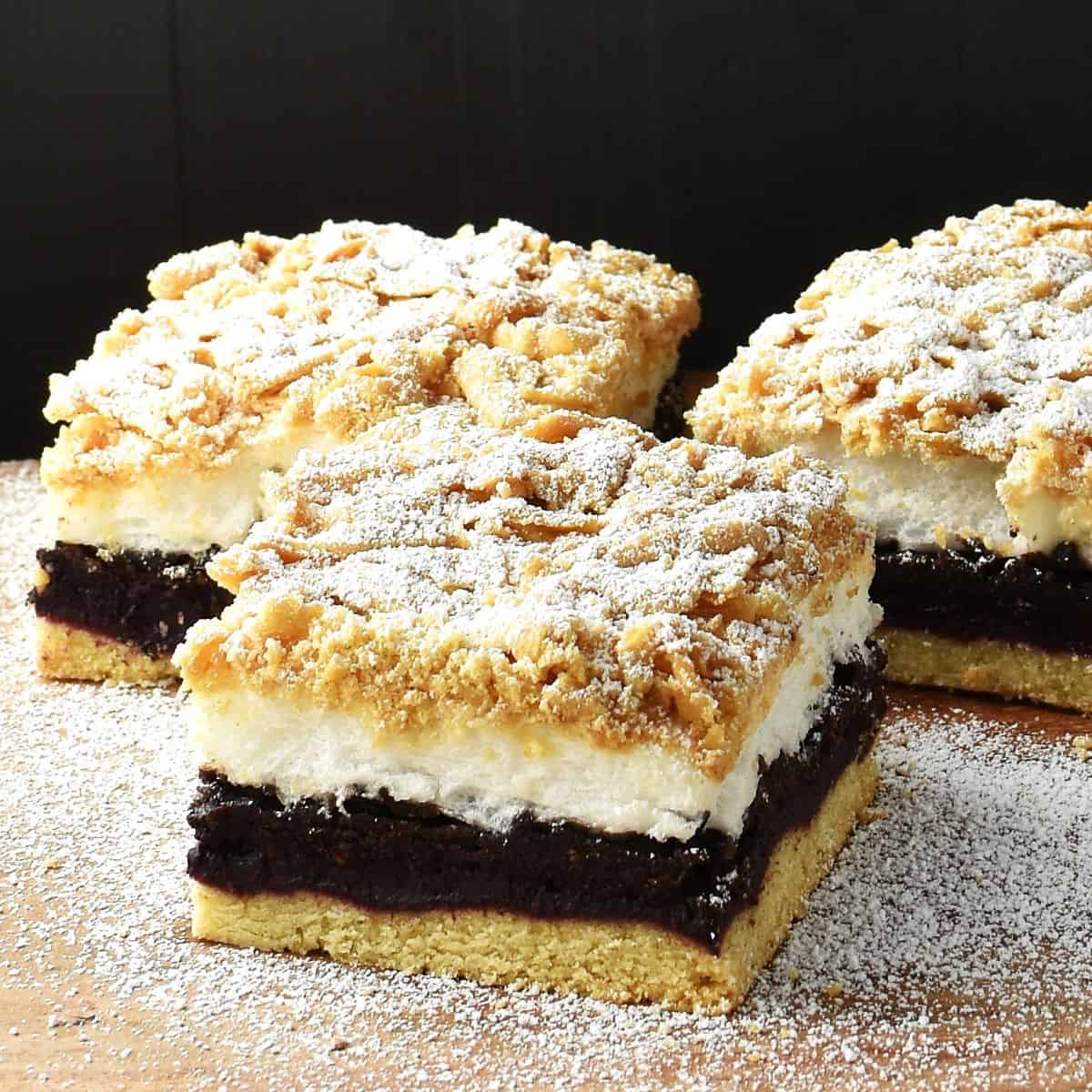
Polish pleśniak cake (also called 'skubaniec') features a tangy fruit filling and sweet, soft meringue sandwiched in between layers of shortcrust pastry. The word pleśniak (pron. 'PLESH-nyak) comes from 'pleśń', which means 'mould', referring to the meringue giving this cake a 'mouldy' appearance. Thankfully, this unappetising image does not reflect the flavour of this cake, which is delicious!
I remember pleśniak cake particularly well from my childhood as it was a family favourite. This recipe is almost identical to the one my mom used to make, with one small difference. While she used a type of homemade plum jam/preserve called 'powidła' (which takes hours to cook) I opted for a mixture of sour tasting fruit and prunes, instead. The tartness of the fruit balances out the sweetness of the meringue.
My pleśniak recipe produces a light, delicious cake that's simple to make and not overly sweet. It does require a bit of time, but you can prepare it over a couple of days (see my tips at the bottom of the post).
Pleśniak cake ingredients and substitutions
- Flour: use all-purpose/plain flour.
- Baking powder.
- Butter.
- Sugar: I used confectioners'/icing sugar for the pastry and superfine/caster sugar for the meringue.
- Fruit: use mixed berries, red/black currants, sour cherries or another sour tasting fruit, along with prunes. Some pleśniak recipes use red/black currant jam, or another sour tasting jam, which are fine to use, instead, provided they are quite thick, not runny. Bear in mind, however, that jam contains a lot of sugar and your cake might be too sweet.
- Cocoa powder.
- Eggs: make sure your egg whites are at room temperature.
- Potato starch.
- Yogurt: you can use sour cream, instead.
- Vanilla extract.
Step-by-step recipe instructions
1. Make fruit mixture: Cook the fresh/frozen fruit with prunes over a medium heat for about 20 minutes until most of the moisture has evaporated, stirring often. Puree then set aside to cool (the mixture will thicken as it cools).
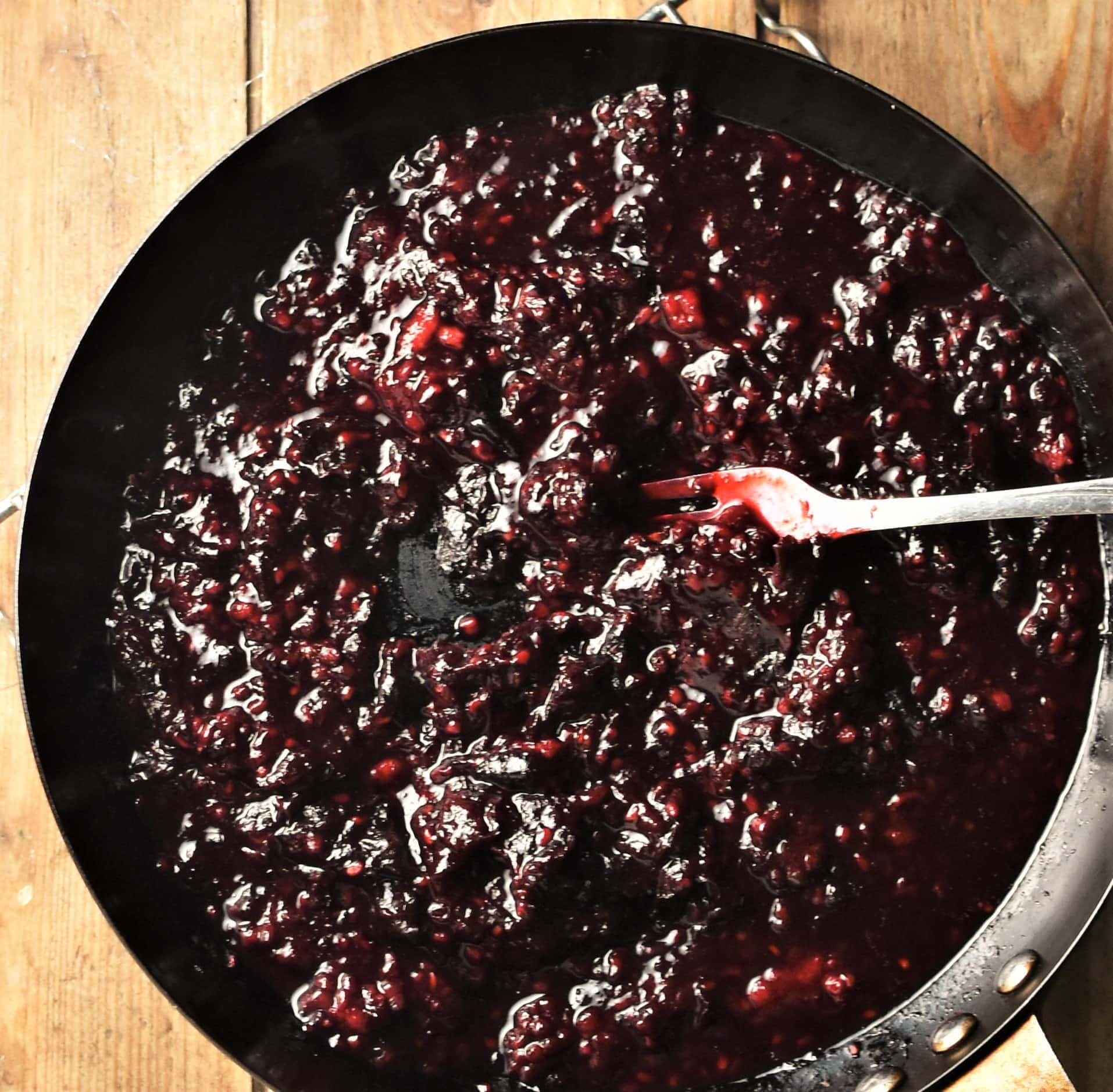
2. Make pastry: Place the flour, baking powder, salt, confectioners' sugar and butter in a food processor. Pulse until the mixture resembles fine breadcrumbs. Add the egg yolks, 2 tablespoons of yogurt and vanilla extract and pulse until the ingredients come together in a dough.
TIP: Alternatively make the pastry by hand.
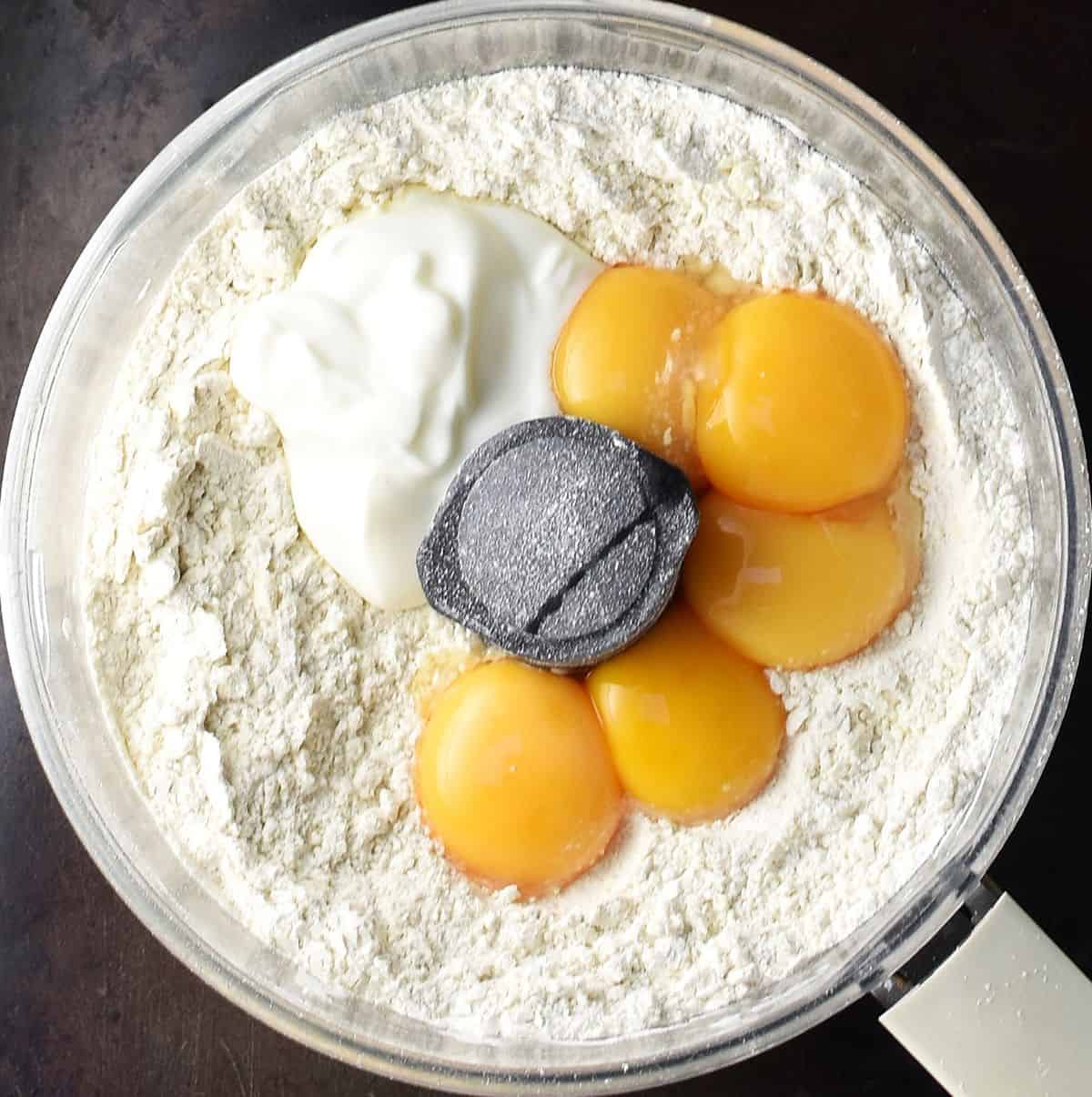
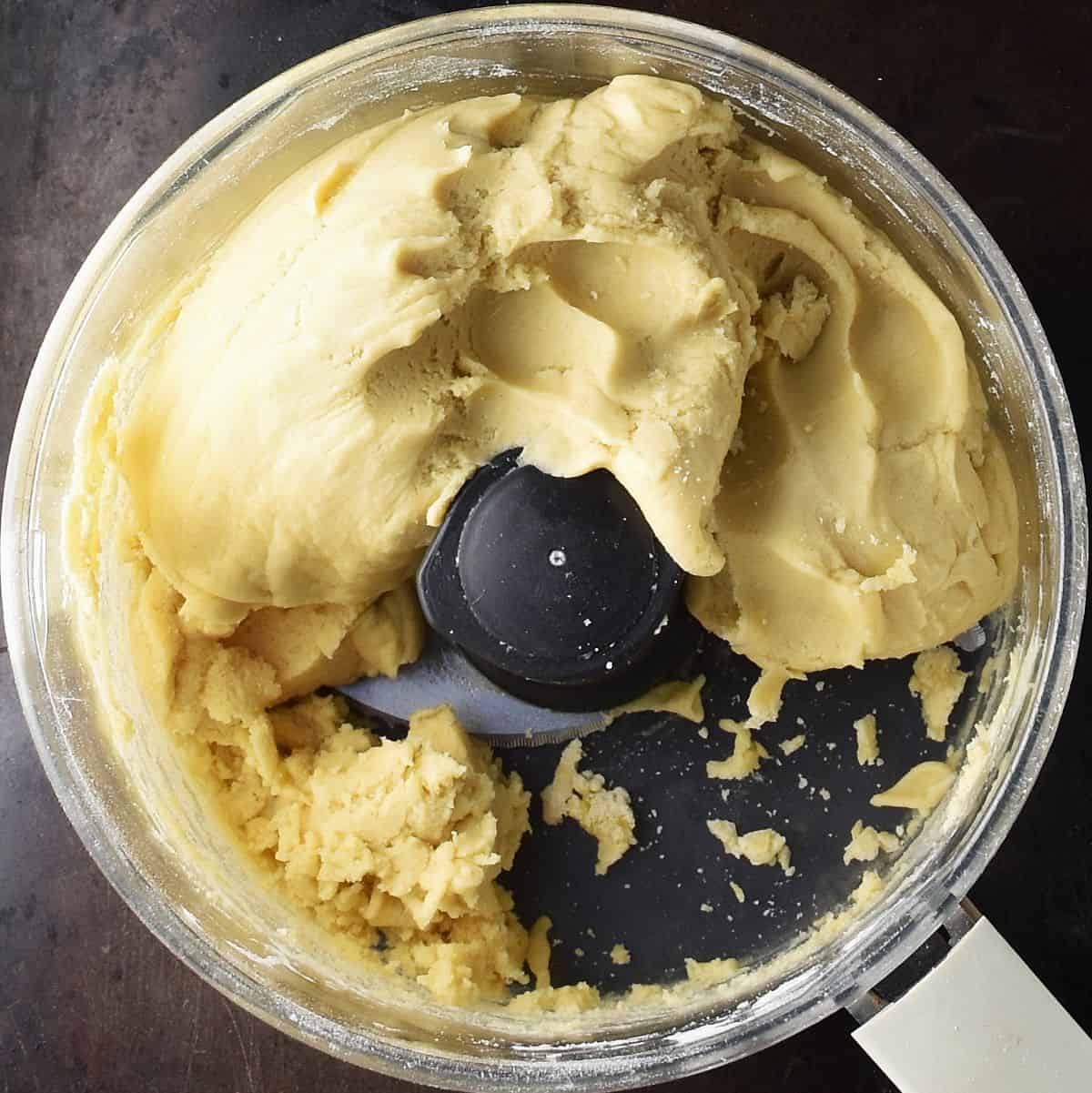
4. Chill pastry: Form a thick log and cut it in half. Cut one half into 2 equal parts. Place one of these small parts in a large shallow bowl, flatten, add the cocoa powder, 1 teaspoon of yogurt and knead in. Place all the dough parts in the freezer for 30 minutes. After 15 minutes preheat the oven to 375 F/180 C/160 fan/gas mark 4.
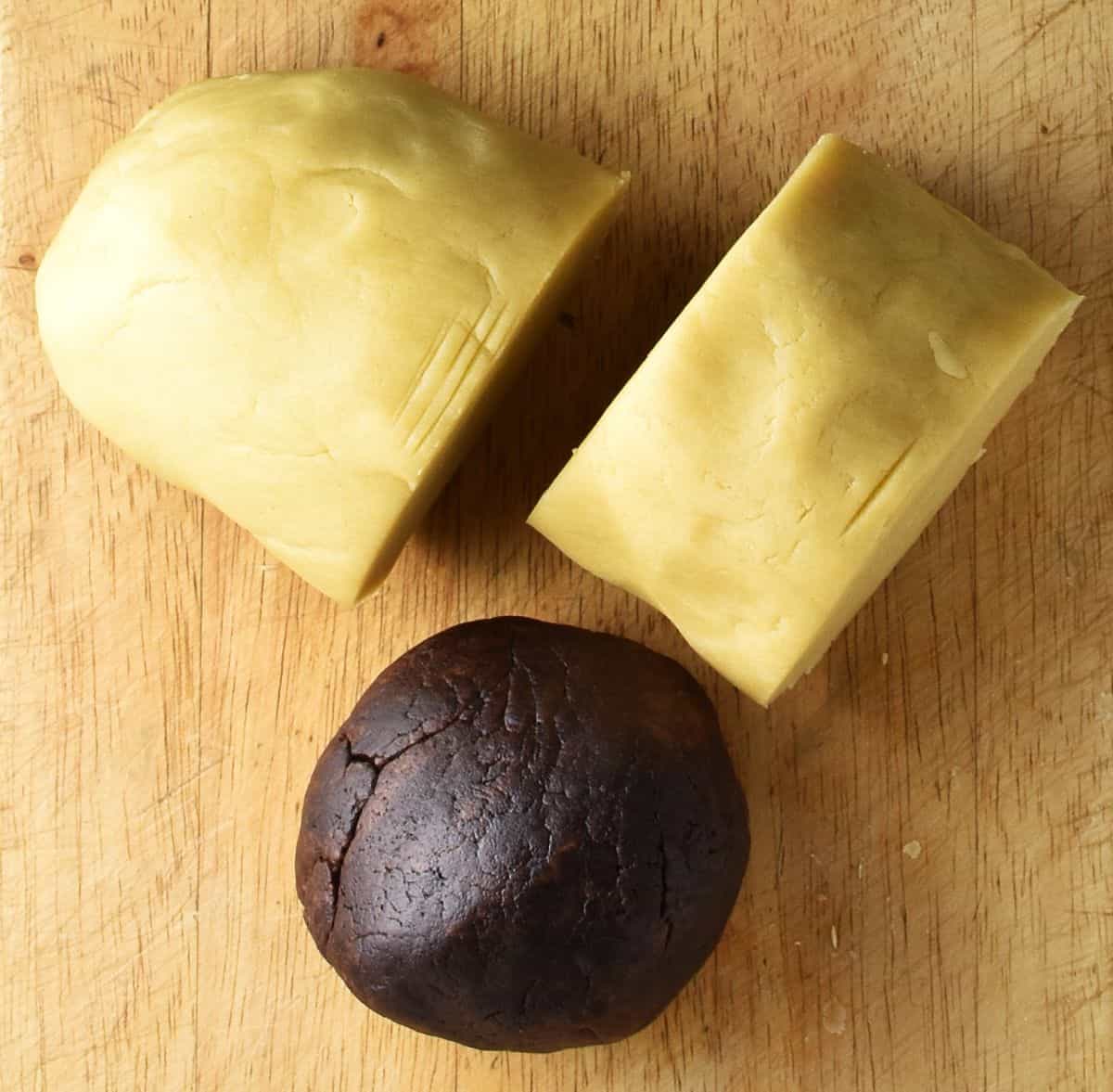
5. Blind bake crust: Remove the large dough from the freezer (and place the remaining 2 in the fridge for now), cut into thin slices (4-5 mm) and spread over the bottom of the pan. Press the dough into the bottom of the pan spreading as evenly as you can (it will be quite a thin layer). Pierce all over with a fork and bake in the centre of a preheated oven for 14 minutes. Remove from the oven and set aside to cool.
TIP: If your pan isn't non-stick either grease it lightly and dust with flour before using or line with parchment.
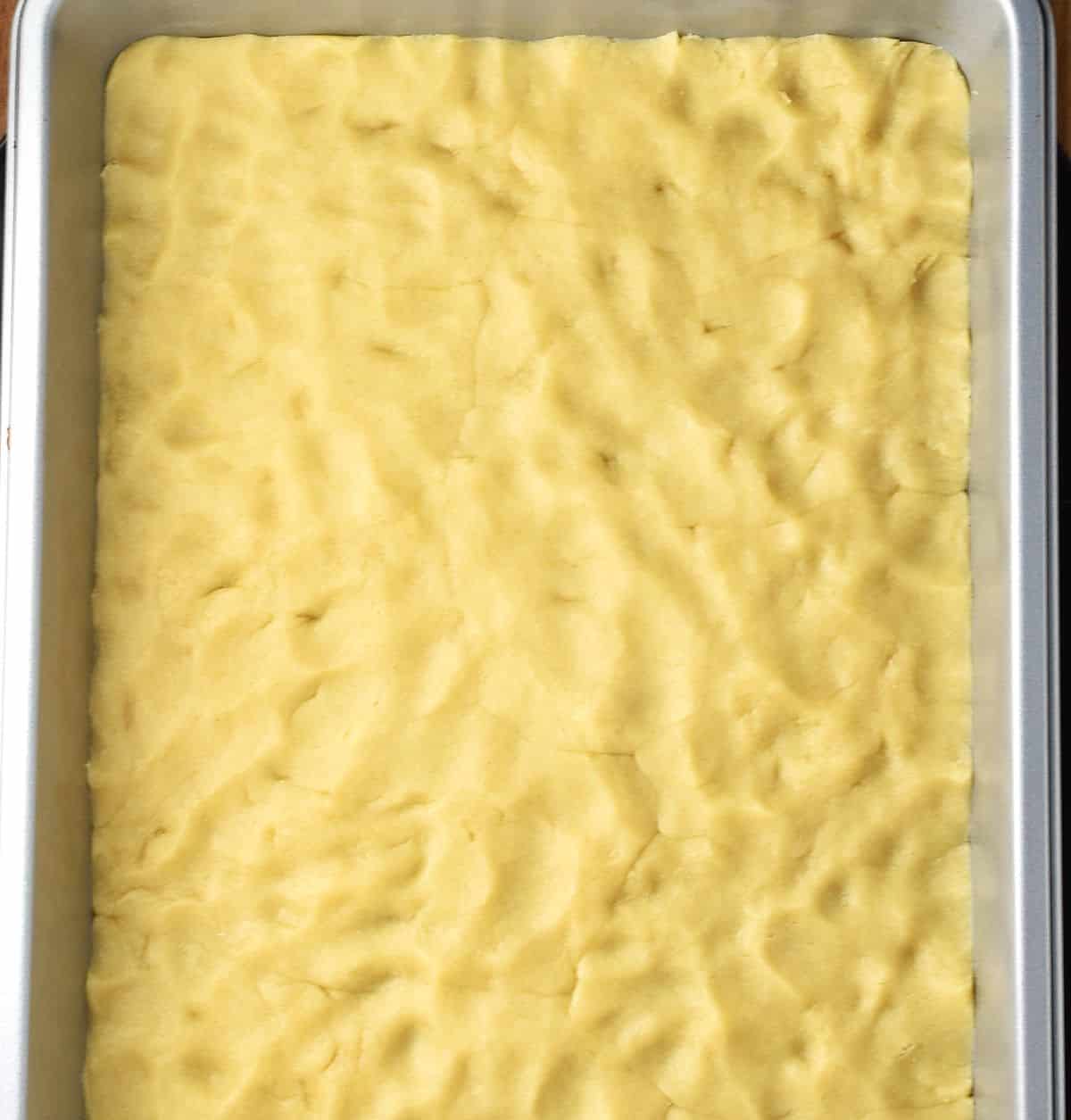
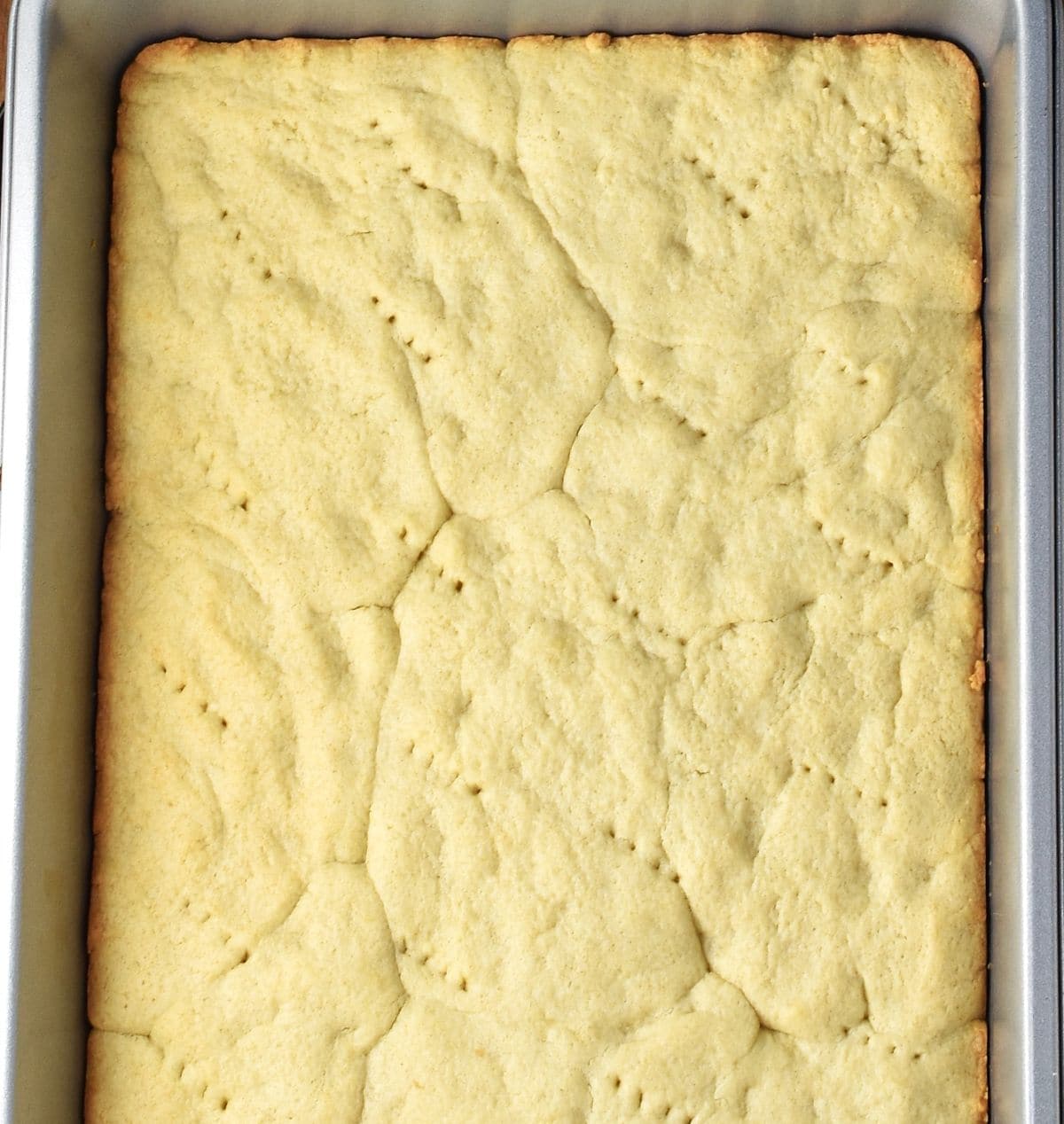
6. Add fruit layer: Spread the fruit mixture over the crust.
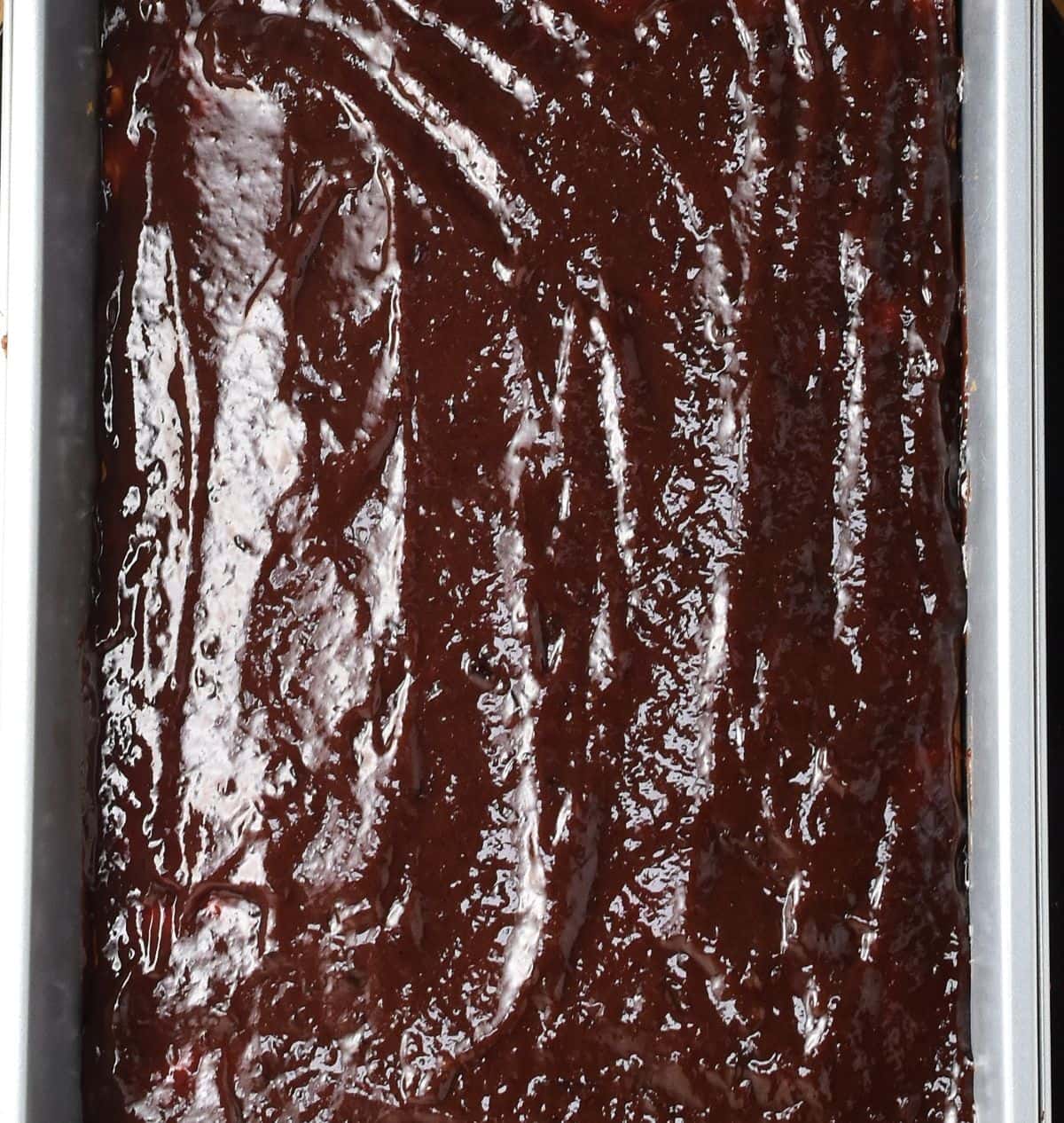
7. Add chocolate pastry: Coarsely grate the chocolate dough over the fruit layer. Pat very gently to make it level (without pressing down too much) then refrigerate. If you have switched the oven off preheat it again to 325 F/170 C/150 fan/gas mark 3.
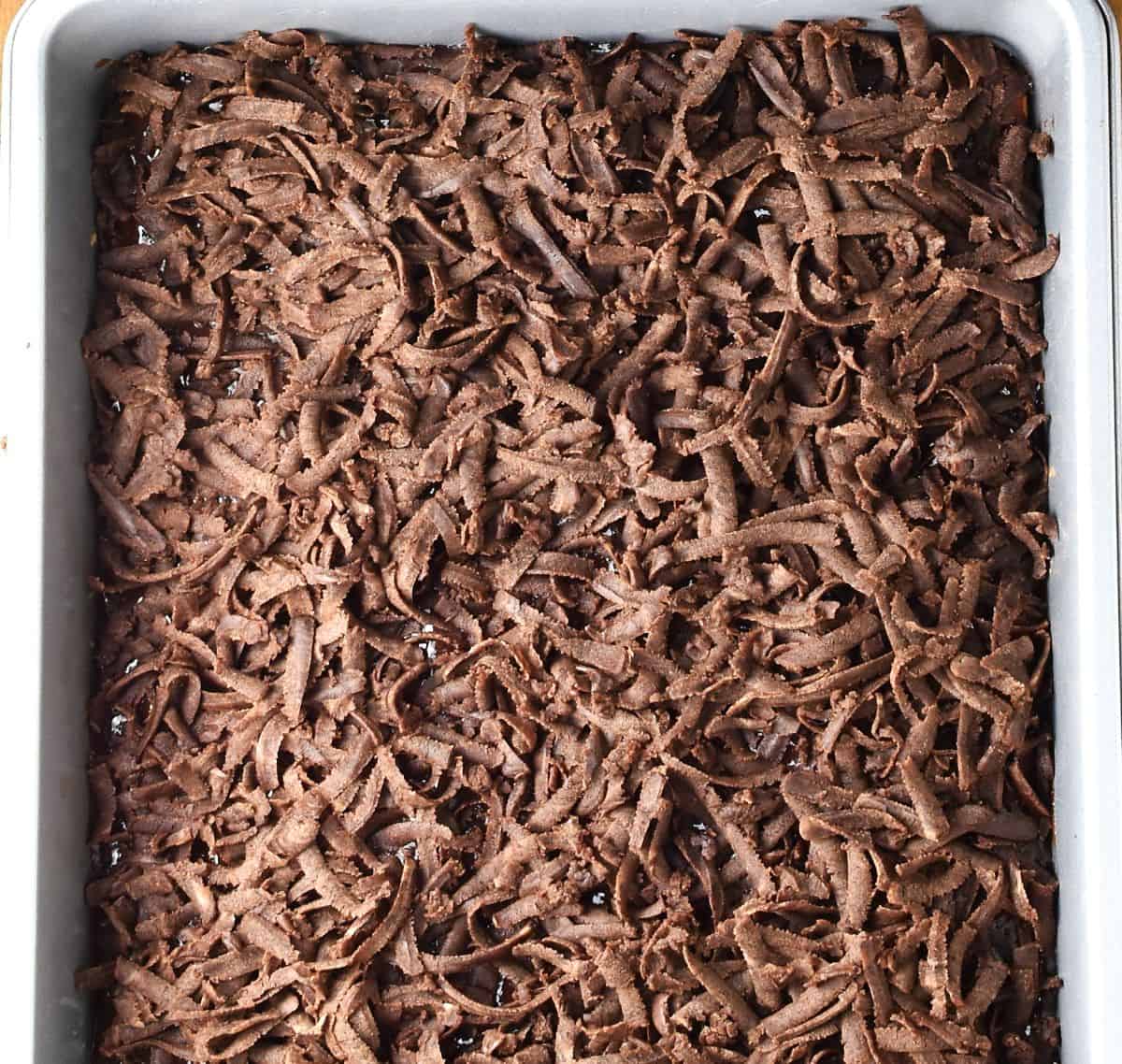
8. Make meringue: Place the egg whites in a clean, dry bowl, add a pinch of salt and beat for a minute or so starting from the lowest setting then slowly increasing to 3 on a stand mixer (not higher) until the mixture looks like a bubble bath (it shouldn't have stiff peaks at this point so don't overbeat it). Start (slowly) adding heaped tablespoons of superfine sugar (setting 3 on a stand mixer) beating for a minute after each addition. After adding the last of the sugar beat for 2 minutes. The mixture should be thick and glossy. Turn the mixer off and sift the potato flour over the top. Using the lowest setting (this is important!) mix the flour into the meringue just to incorporate.
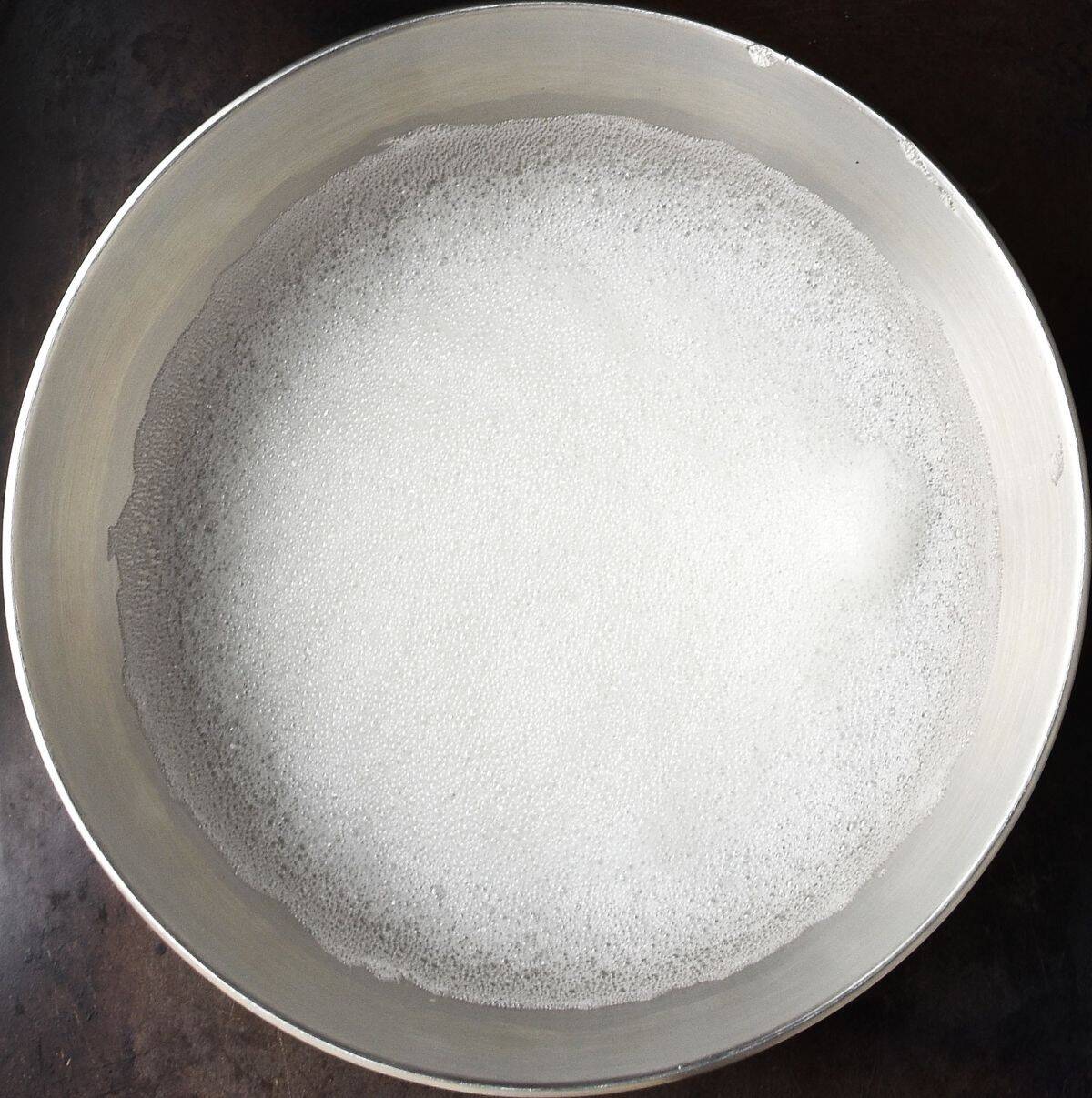
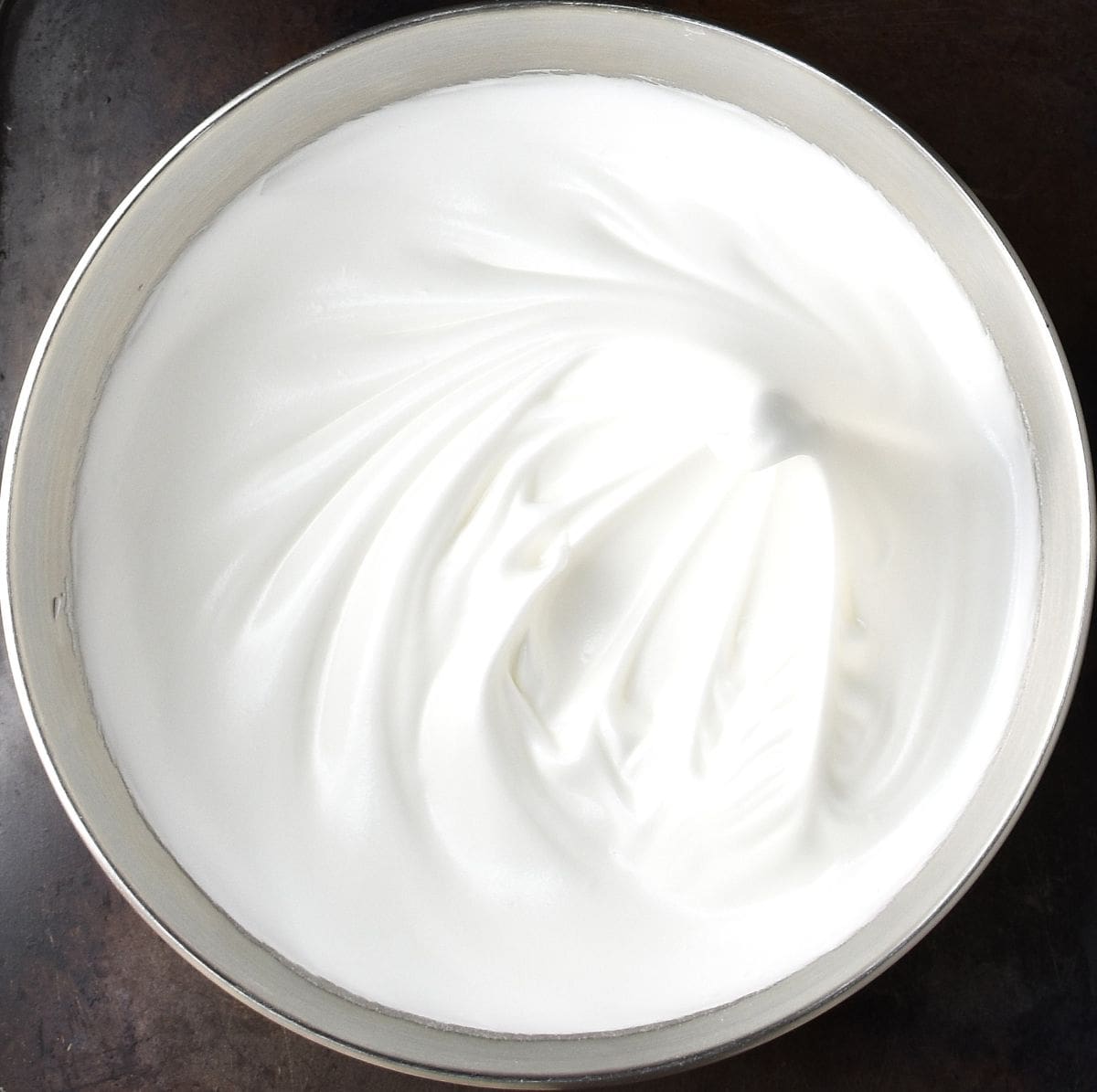
9. Make meringue and crumb layers: Remove the cake pan from the fridge and gently spread the meringue over the chocolate dough filling any gaps to remove air pockets. Coarsely grate the remaining dough over the whole thing.
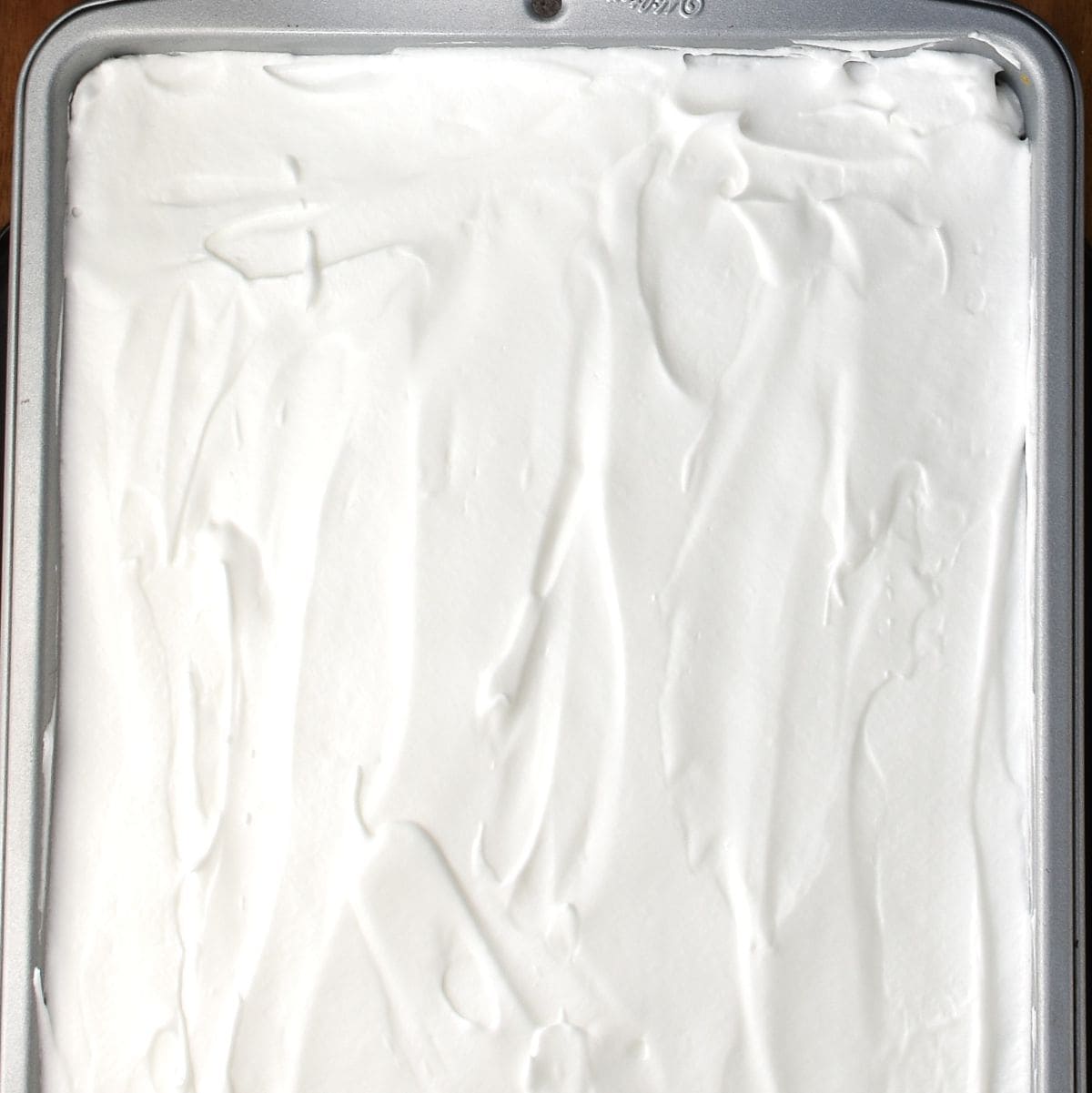
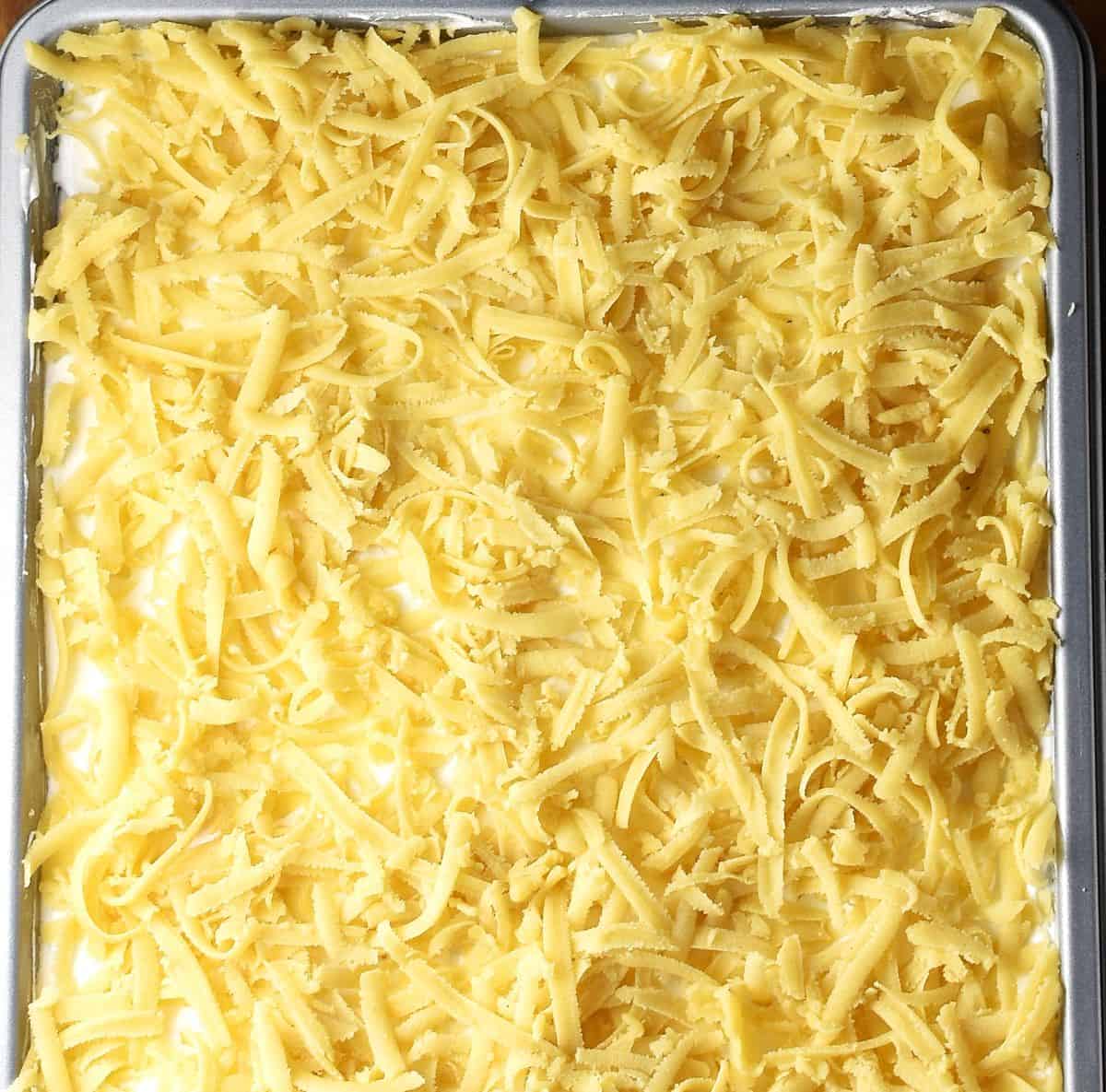
10. Bake: Bake in the centre of the oven for 50 minutes then lower the heat to 300 F/ 150 C/gas mark 2 and continue baking for 10 more minutes. Turn the oven off and leave the pleśniak in the oven until cooled completely (1.5-2 hours). Do not open the oven door at any point during baking and cooling.
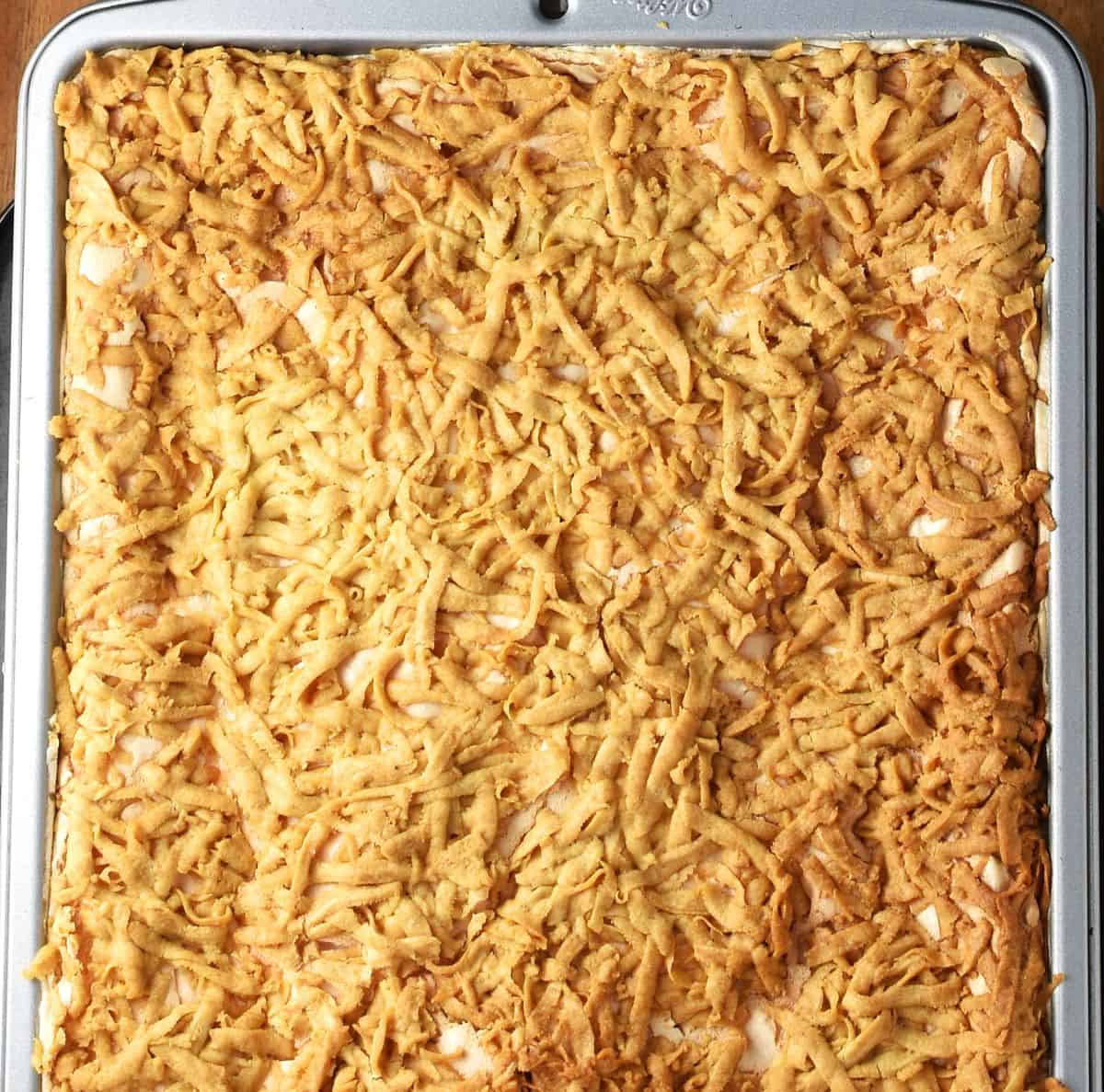
Serving suggestions
Traditional pleśniak is served with a dusting of powdered sugar and is delicious with tea or coffee. For best results enjoy at room temperature (the pastry will be softer).
What can I make ahead
- Fruit layer: Once cooled cover and refrigerate overnight.
- Pastry: Wrap each pastry in cling film and refrigerate overnight (up to 3 days). You do not need to place this pastry in the freezer before using.
- Blind bake crust: Once cooled completely refrigerate overnight and finish making the cake the following day.
Top tips
- Use frozen or fresh tart fruit.
- To save time make the pastry while you wait for the fruit mixture to cool.
- The egg whites must be at room temperature.
- It's important not to overbeat the egg whites (see Instructions).
- Allow the cake to cool completely in the oven to ensure the meringue stays light and fluffy. The top might look a little uneven but that's normal.
- Cover leftover pleśniak cake with a tea towel and keep in at room temperature for up to 2 days. After that time refrigerate (or keep in a cool place) for up to 2 more days.
- Freeze for up to 3 months.
Related recipes to try next
- Almond Redcurrant Cake
- Polish Rogaliki (Rugelach) Crescent Cookies
- Traditional Baked Polish Cheesecake (Sernik)
See also these other traditional Polish recipes and more dessert recipes!
Recipe
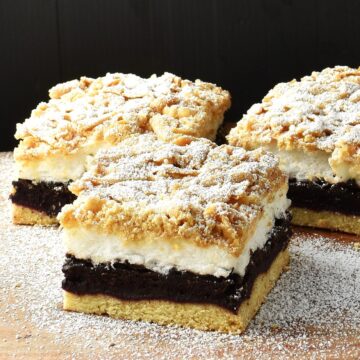
Polish Pleśniak Cake
Equipment
- 8½/13-inch pan 22/33 cm
- Food processor
- Box grater
- Blender
- Mixer
Ingredients
- 3¾ cups (470 g) all purpose/plain flour
- 1⅓ teaspoons baking powder
- ⅓ cup (50 g) confectioners'/icing sugar
- ¼ teaspoon fine sea salt
- 2 sticks+2tbsp (250 g) butter chilled, cubed
- 2 tablespoons yogurt plus 1 tsp, chilled
- 2 teaspoons vanilla extract
- 5 large eggs separated, at room temperature
- 2½ tablespoons cocoa powder
- 2 tablespoons potato starch
- 1 cup+1tbsp (200 g) superfine/caster sugar
- 1.1 pounds (500 g) mixed fruits tart, ex. red/black currants, berries, sour cherries, etc. frozen or fresh
- 20 prunes pitted, finely chopped
Instructions
- Make fruit mixture: Cook the fresh/frozen fruit with prunes over a medium heat for about 20 minutes until most of the moisture has evaporated, stirring often. Puree then set aside to cool.
- Make pastry: Place the flour, baking powder, salt, confectioners' sugar and butter in a food processor. Pulse until the mixture resembles fine breadcrumbs. Add the egg yolks, 2 tablespoons of yogurt and vanilla extract and pulse until the ingredients come together in a dough.TIP: Alternatively make the pastry by hand.
- Chill pastry: Form a thick log and cut it in half. Cut one half into 2 equal parts. Place one of these small parts in a large shallow bowl, flatten, add the cocoa powder and 1 teaspoon of yogurt and knead in. Place all the dough parts in the freezer for 30 minutes. After 15 minutes preheat the oven to 375 F/180 C/160 fan/gas mark 4.
- Blind bake crust: Remove the large dough from the freezer (and place the remaining 2 in the fridge for now), cut into thin slices (4-5 mm) and spread over the bottom of the pan. Press the dough into the bottom of the pan spreading as evenly as you can (it will be quite a thin layer). Pierce all over with a fork and bake in the centre of a preheated oven for 14 minutes. Remove from the oven and set aside to cool. TIP: If your pan isn't non-stick either grease it lightly and dust with flour before using or line with parchment.
- Add fruit layer: Spread the fruit mixture over the crust.
- Add chocolate pastry: Coarsely grate the chocolate dough over the fruit layer. Pat very gently to make it level (without pressing down too much) then refrigerate. If you have switched the oven off preheat it again to 325 F/170 C/150 fan/gas mark 3.
- Make meringue: Place the egg whites in a clean, dry bowl, add a pinch of salt and beat for a minute or so starting from the lowest setting then slowly increasing to 3 on a stand mixer (not higher) until the mixture looks like a bubble bath (it shouldn't have stiff peaks at this point so don't overbeat it). Start (slowly) adding heaped tablespoons of superfine sugar (setting 3 on a stand mixer) beating for a minute after each addition. After adding the last of the sugar beat for 2 minutes. The mixture should be thick and glossy. Turn the mixer off and sift the potato flour over the top. Using the lowest setting (this is important!) mix the flour into the meringue just to incorporate.
- Make meringue and crumb layers: Remove the cake pan from the fridge and gently spread the meringue over the chocolate dough filling any gaps to remove air pockets. Coarsely grate the remaining dough over the whole thing.
- Bake: Bake in the centre of the oven for 50 minutes then lower the heat to 300 F/ 150 C/gas mark 2 and continue baking for 10 more minutes. Turn the oven off and leave the pleśniak in the oven until cooled completely (1.5-2 hours). Do not open the oven door at any point during baking and cooling.
Notes
-
- Use frozen or fresh mixed berries, red/black currants, sour cherries or another sour tasting fruit, along with prunes. Some pleśniak recipes use red/black currant jam, or another sour tasting jam, which are fine to use, instead, provided they are quite thick, not runny. Bear in mind, however, that jam contains a lot of sugar and your cake might be too sweet.
-
- To save time make the pastry while you wait for the fruit mixture to cool.
-
- The egg whites must be at room temperature.
-
- It's important not to overbeat the egg whites (see Instructions).
-
- Allow the cake to cool completely in the oven to ensure the meringue stays light and fluffy. The top might look a little uneven but that's normal.
-
- Cover your pleśniak cake with a tea towel and keep at room temperature for up to 2 days. After that time keep in a cool place for up to 2 more days.
-
- Freeze for up to 3 months.
Nutrition
*Nutritional information is automatically generated and should be considered as an estimate.
**A note about baking: If using a fan-assisted oven refer to your appliance's instructions and adjust the temperature accordingly.
Keep in touch!
If you make this Polish pleśniak cake recipe I'd love to know how it turned out for you. Let me know in the comments below, thanks!
Follow me on Facebook, Instagram and Twitter for regular recipe updates! Or you could subscribe to this blog and receive all my latest recipes right into your mailbox!

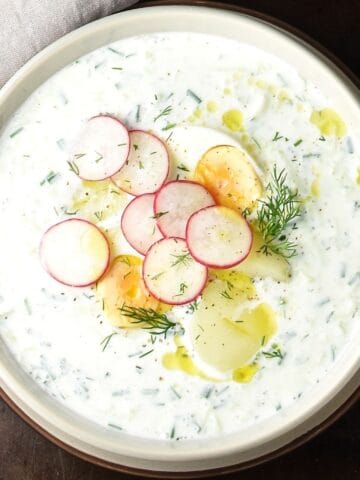
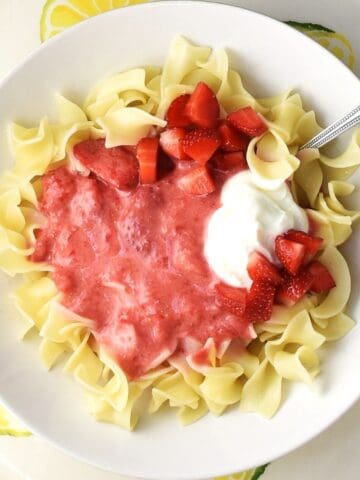
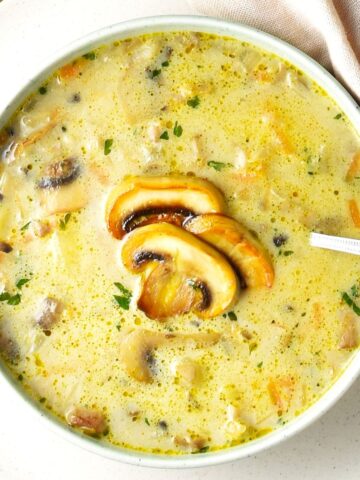
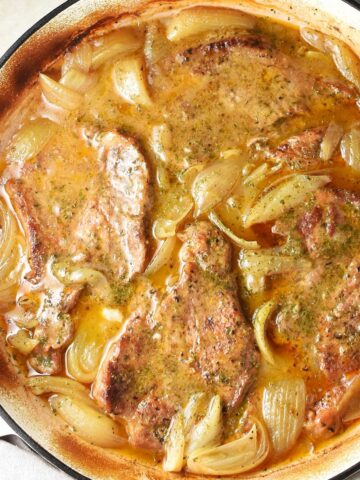
Julia says
Made this today and it turned out perfect! Such a great dessert. I followed your recipe exactly and it turned out fantastic. My husband is Polish but his family doesn’t make this dessert. Yummy! Thank you for sharing 🙂
Monika says
Glad you liked it! This is one of my favourite Polish cakes and I am always happy to know other people like it too. Thank you for your feedback:)
Antje says
Hi Monika,
I grew up with a similar plum 'jam' called Pflaumenmus. The Thuringian way bakes rather than cooks them. Whilst it still takes hours, you don't need to stir.
Now, I currently don't have access to my recipe (shipping from OZ to UK....), I try to write it down from memory:
- grease a very solid casserole dish
- fill your dish with halved very ripe plums (our dish takes about 3.5kg)
- add star anise, cloves and cinnamon stick in a musselin 'sock' and place between the fruit plus (if available) a couple of green walnuts (i.e. as it comes off the tree, including the green peel and the hard shell you would normally crack to get to the nut. Otherwise just add some shelled nuts)
- measure about 350g of sugar - traditionally white but I tend to use brown or coconut, whatever available
- sprinkle some of it on top
- into a hot oven. Start with ~200°C
- tradition: no lid and oven door slightly ajar (use wooden spoon). However, I start off for the first hour with lid and closed door to get things boiling
- every half an hour you want to add a little bit more sugar on top. Don't stir - you kinda need a crust. Though I do one (again non-traditional) compromise of slightly padding the surface down to get a little of the juice over it. (I believe our grandmothers made this in much larger pots so the crust was like a lid and also percentage wise not as much of a waste as it feels when you cook only 3.5kg)
- you will need 6 to 8 hours until it cooks down to a nice thick paste. I find I need pen and paper at the stove to keep track of time 😉
- once you like the consistency, fill it into clean jars. Lid on. Done!
Monika says
Hi Antje! Thank you for taking the time to share this recipe with me! I can just imagine how delicious it must be after 8 hours of slow baking. And I really like the star anise in your jam. The green walnuts sound intriguing. I might try this method if I can get my hands on some inexpensive plums. 3.5 kg is a lot of plums:)
Daniela Anderson says
They look absolutely scrumptious, I've had such a sweet tooth recently, and these squares would go down a treat. I don't bake with fruit as much as I should. Delicious!
Monika says
Thank you!
Monika says
Thank you! Sounds like a definite case of prune overdose:)
The Bearded Hiker says
Yeah, I believe I'll be making these soon. I love prunes! I won't tell anyone that it's prunes though...they have a bad reputation. One time my wife and I were eating some prunes and I asked my son if he wanted one. "No way! I'm not eating prunes! That's for old people!" Ok, not sure where he got that from but a couple of days later, we're eating prunes again and my wife asked him if he wanted a dried plum. "Yeah, i love plums!" Kids.
Monika says
Thanks! I agree prunes do have a bad reputation, completely undeservedly, because they taste SO good and are so good for you too:) Maybe they should always be called 'dried plums':)
Monika says
Thank you! I agree that childhood memories make any dish a little bit more special:)
Monika says
Thank you Kat:)
Jhuls says
I am eating prunes as they are, but it sounds amazing to add them in your baked good, too. Thanks for sharing!
Monika says
You are welcome:)
Monika says
Thanks! Hope you like it:)
Eb Gargano says
This cake sounds fab and I love your shortcut! I'm a big fan of shortcuts too. Eb x
Monika says
Thank you Eb! I think these days people are so busy they need shortcuts, otherwise we'd all be eating takeouts!
Monika says
Thank you Angela! I am bringing my squares over to your link party now!
Angela / Only Crumbs Remain says
Thankyou so much for linking up Monika, it's fab to have you there 🙂
Monika says
I know it's hard to stay off sugar, there are so many temptations everywhere, especially when you go shopping. I find it impossible to go without sugar completely, instead I try to eat less of it... it works most of the time:)
Monika says
Thank you! My own children enjoyed these squares as a snack, with a glass of milk.